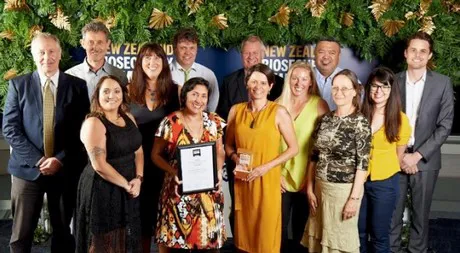The Myrtle Rust Research Consortium has won a top biosecurity award for its integrated and rapid research response to myrtle rust.
The Consortium won the Bio-Protection Research Centre Science Award in the 2019 Biosecurity Awards, presented on 4 November. Members of the Consortium were on hand to celebrate and collect the award (pictured).

Myrtle rust (caused by Austropuccinia psidii) has devastated ecosystems in Australia and impacts for New Zealand could be similar if there is no intervention.
Since the incursion in Australia, New Zealand’s government and science groups had been developing readiness. When the pathogen was detected here in mid-2017, a response was initiated.
Within a short period of time, a comprehensive research programme was assembled and commissioned through the Ministry for Primary Industries (MPI) and Ministry for Business, Innovation and Employment (MBIE).
As a group, government (MPI, Department of Conservation, MBIE), the science community, iwi, industry stakeholders and other key organisations worked together via workshops, interactive research networks and a Myrtle Rust Strategic Science Advisory Group to design and undertake high-quality research, delivering tools and knowledge to safeguard New Zealand’s taonga (treasured) species and at-risk ecosystems.
Research was targeted to resolve fundamental questions about myrtle rust biology and how this disease affects myrtaceous hosts in the New Zealand environment. Outcomes have addressed Te Ao Māori perspectives, building effective community engagement and social license, and identifying methods to survey, treat and control.
The research reports commissioned by MPI are now complete and are available on this website. They provide knowledge and practical insights about managing myrtle rust in New Zealand.
Source: Myrtle Rust Research Consortium
